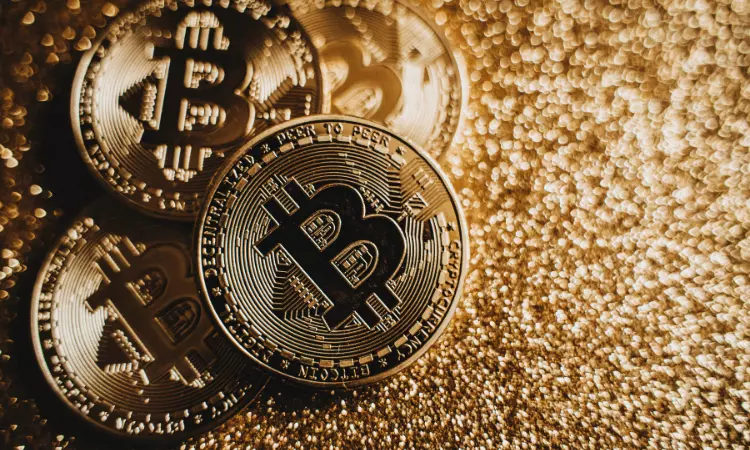In today’s rapidly evolving financial landscape, the comparison between cryptocurrency and gold has become a captivating subject of discussion.
The rise of cryptocurrencies, most notably Bitcoin, has led to widespread speculation about whether these digital assets are poised to replace or merely complement the age-old status of gold as a safe haven and store of value.
With both assets displaying unique characteristics and investment attributes, it’s crucial to delve deeper into this debate.
In this article, we will delve into the characteristics of both cryptocurrency and gold, exploring their similarities and differences to determine whether the rise of cryptocurrencies signals a new era in the age-old debate of value storage.
By the end, you will have a clearer understanding of whether cryptocurrency is poised to dethrone gold as the ultimate store of value.
Is Cryptocurrency The New Gold?
The “new gold” status of cryptocurrency remains a complex and debated issue.
Cryptocurrency is often compared to gold due to its role as a store of value and its potential to hedge against inflation and economic uncertainties.
Both assets share some similarities, such as limited supply (in the case of Bitcoin) and the absence of direct government control.
For instance, Bitcoin’s protocol dictates a maximum supply of 21 million coins, contributing to its scarcity and often drawing comparisons to the rarity of gold.
Also, in times of economic turbulence, both gold and cryptocurrencies have demonstrated their resilience as assets that investors flock to for safety.
Gold’s historical track record as a hedge against inflation and economic instability has cemented its status as a reliable store of value.
Similarly, the narrative around Bitcoin has shifted from its early days as a speculative tool to its portrayal as “digital gold.”
This transition underscores the growing recognition of Bitcoin’s potential to serve as a long-term store of value, akin to gold.
Decentralization is a fundamental characteristic shared by both gold and cryptocurrencies.
Gold’s value is largely immune to government control and economic policies, a feature that has contributed to its enduring allure.
Likewise, cryptocurrencies operate on decentralized networks, free from centralized authority.
Bitcoin, for instance, operates on a blockchain that is maintained by a network of nodes distributed globally.
This decentralized structure aligns with gold’s historical independence from governmental manipulation, making cryptocurrencies an intriguing digital counterpart to physical gold.
However, cryptocurrencies are highly speculative and volatile, subject to regulatory changes, and lack the long-established history and intrinsic value of gold.
While cryptocurrencies may complement traditional assets, they are not a direct replacement for gold, which has centuries of trust and intrinsic value backing it.
Investors should consider their risk tolerance and investment goals when comparing the two.
The Rise Of Bitcoin: A Digital Store Of Value.
Among cryptocurrencies, Bitcoin has emerged as a prominent player, often referred to as digital gold.
This designation is not without merit, as Bitcoin’s journey exhibits numerous attributes reminiscent of gold’s historical trajectory.
A critical factor in this comparison is Bitcoin’s halving events.
Roughly every four years, the supply of new Bitcoin entering circulation gets halved, reducing the rate at which new coins are minted.
This mirrors gold’s scarcity-driven value proposition, where the limited rate of new gold discoveries contributes to its value.
The surge in institutional interest and adoption further parallels gold’s ascent to prominence.
Traditional financial institutions and corporations have begun to recognize the potential of Bitcoin as a hedge against inflation and a diversification tool.
This influx of institutional capital echoes the historical moments when gold transitioned from being hoarded by individuals to being embraced by institutions and central banks as a form of reserves.
Bitcoin’s narrative evolution from a speculative asset to a hedge against inflation mirrors gold’s own narrative shift over centuries.
As economic uncertainty heightens, investors seek assets that can preserve their wealth.
Gold’s ability to act as a safe haven has been proven repeatedly, with demand surging during periods of financial distress.
Bitcoin, with its limited supply and decentralized nature, is also positioning itself as a modern safe haven asset, attracting investors who seek to shield their portfolios from traditional market vulnerabilities.
Differences Between Gold And Cryptocurrency.
While the comparisons between gold and cryptocurrencies are intriguing, it’s crucial to acknowledge the inherent differences that set these assets apart.
One of the most apparent distinctions lies in their physicality.
Gold is a tangible metal with inherent value due to its various industrial and ornamental applications.
In contrast, cryptocurrencies are entirely digital, existing solely in the digital realm.
This dichotomy has implications for how these assets are perceived and utilized.
Gold’s industrial applications give it a unique edge that cryptocurrencies lack.
Beyond its role as a store of value, gold is a crucial component in various industries, including electronics, aerospace, and jewelry.
This practical utility contributes to its demand, ensuring that it remains relevant regardless of its financial value.
Cryptocurrencies, on the other hand, derive their value primarily from their adoption as a medium of exchange or a store of value, leaving them without the diverse array of applications that bolster gold’s demand.
Regulation also marks a significant point of departure between gold and cryptocurrencies.
Gold has an established history within the regulatory frameworks of most countries, with clear guidelines for ownership, trading, and taxation.
Cryptocurrencies, being a relatively new phenomenon, have faced a more complex regulatory landscape.
The evolving nature of regulations has implications for the perceived risk and legality of investing in cryptocurrencies compared to the well-defined rules governing gold.
Moreover, the volatility of cryptocurrencies sets them apart from gold.
While both asset classes can experience price fluctuations, the extreme volatility witnessed in the cryptocurrency market contrasts with the relatively stable price movements of gold over the years.
This volatility presents challenges for cryptocurrencies to gain widespread acceptance as a reliable store of value and a medium of exchange, hindering their mainstream adoption.
Cryptocurrency’s Role Alongside Gold.
As the debate over whether cryptocurrencies can replace gold continues, it’s essential to consider the idea that these assets might coexist in investment portfolios, serving different purposes.
Diversification, a cornerstone of sound investment strategy, suggests that holding a mix of assets with uncorrelated price movements can help mitigate risk.
In this context, both gold and cryptocurrencies offer potential diversification benefits.
Gold’s historical resilience during economic crises positions it as a strategic hedge in portfolios.
Its value often increases during times of market turmoil, counteracting losses from other assets.
Cryptocurrencies, on the other hand, are still navigating their role in portfolios.
While they have the potential to provide similar hedging benefits, their relatively short track record and heightened volatility warrant careful consideration.
For investors, striking the right balance between these assets requires a thorough understanding of their individual characteristics and risk profiles.
Future Outlook And Implications.
The future trajectory of gold and cryptocurrencies hinges on a multitude of factors, including technological advancements, regulatory developments, macroeconomic trends, and shifting investor sentiment.
Gold’s enduring status as a safe haven asset suggests that it will likely maintain its significance in portfolios, especially during periods of economic uncertainty.
Its role as an industrial commodity further contributes to its lasting demand.
For cryptocurrencies, the road ahead is rife with opportunities and challenges.
As blockchain technology matures and regulatory clarity improves, cryptocurrencies could become more integrated into traditional financial systems.
The potential for increased adoption in sectors such as remittances, cross-border transactions, and decentralized finance (DeFi) could solidify their position in the investment landscape.
However, achieving this requires addressing concerns around security, scalability, and regulatory compliance.
Conclusion.
The question of whether cryptocurrency is the new gold sparks intriguing debates within the financial world.
While both assets share some similarities in their roles as stores of value and potential hedges against economic uncertainties, they also possess distinct characteristics and risks.
Cryptocurrency offers unparalleled liquidity and ease of transfer, attracting investors seeking alternatives to traditional assets.
However, it remains a highly speculative and volatile investment, lacking the historical trust and intrinsic value that gold has accrued over centuries.
Therefore, the notion of cryptocurrency replacing gold entirely is a complex one.
Ultimately, investors should approach both assets with careful consideration, taking into account their unique attributes and their alignment with their specific financial goals and risk tolerance.
As the financial landscape continues to evolve, the relationship between cryptocurrency and gold is likely to be a dynamic one, with each asset serving its purpose in the broader investment portfolio.







